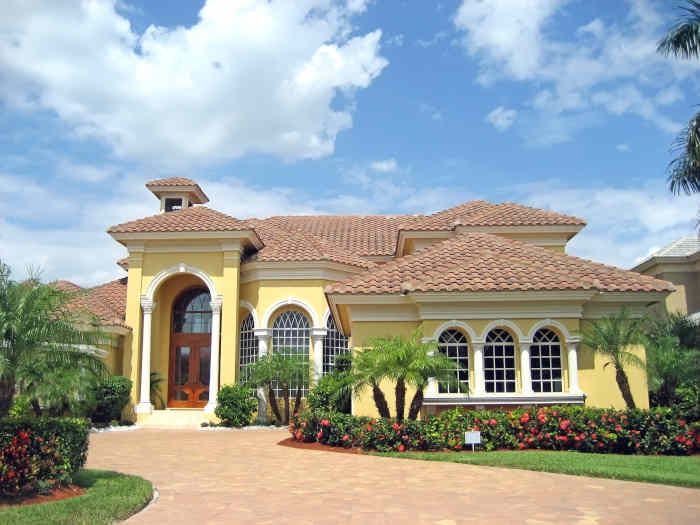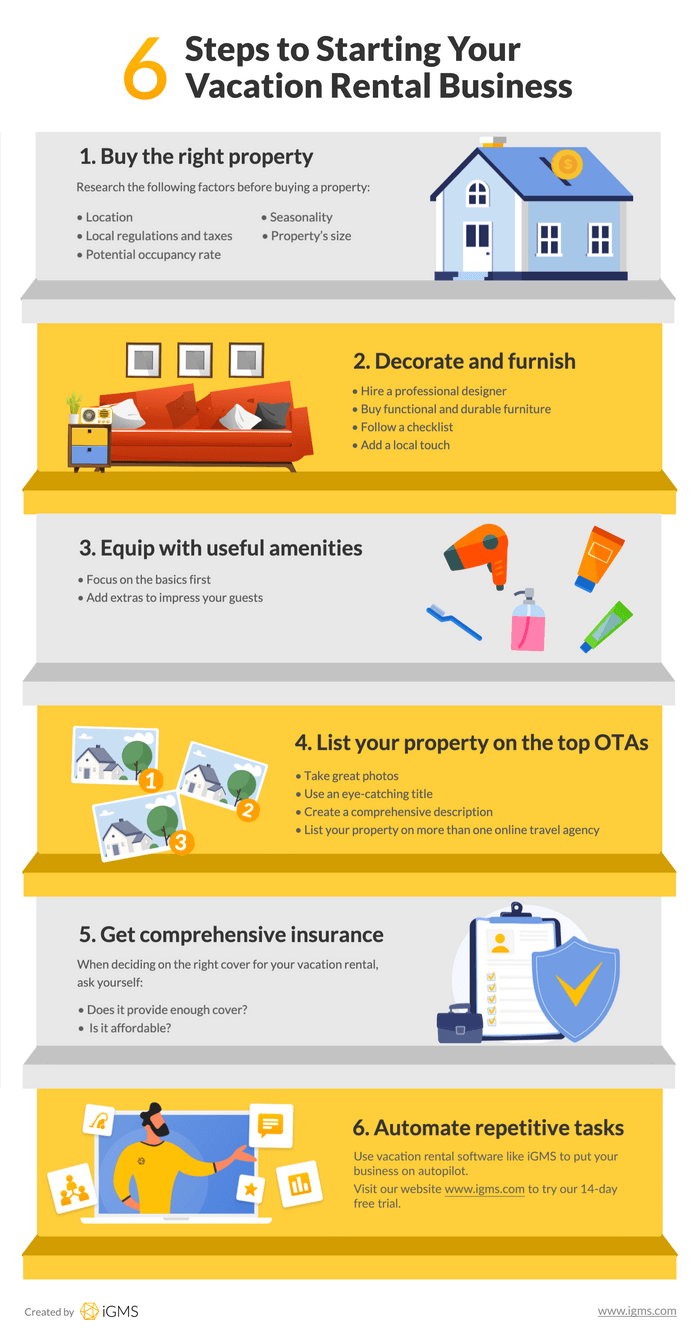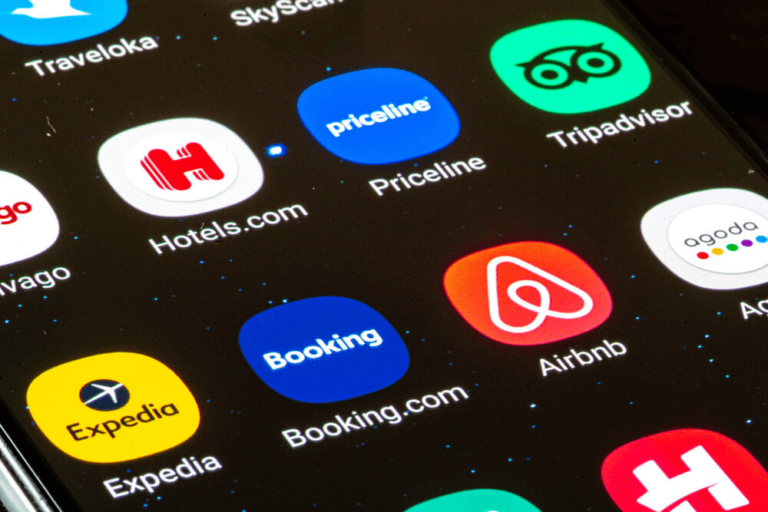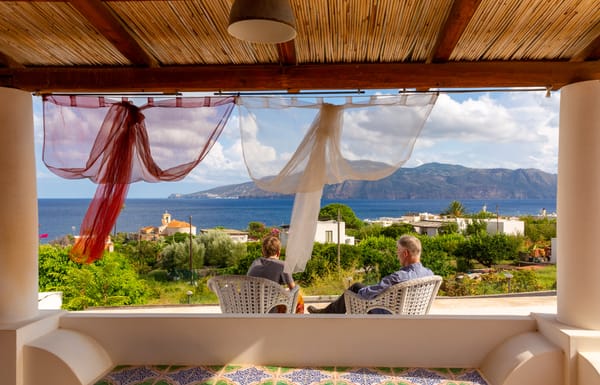How to Make Money on Vacation Rental Property in 13 Steps

n light of the global pandemic, many people are searching for potential side hustles and wondering how to make money on vacation rental property. Owning a second home will not guarantee you an early retirement, but it can be a good investment that generates a steady stream of passive income.
According to John Banczak, the executive chairman of TurnKey Vacation Rentals, for every $100,000 you pay towards a vacation property, you should aim for an annual rental income of about $10,000. On the other hand, the data collected by Airbnb and Vrbo suggests that vacation rental owners can make anything from about $11,000 to as much as $33,000 per year.
We’ve created this practical guide on how to make money on vacation rental property to help short-term rental hosts and property managers make the most of their real estate portfolios.
1. Starting Your Vacation Rental Business
2. Welcoming Your First Guests
3. Maximizing Your Vacation Rental Revenue
4. Making Money on Vacation Rental Property: Top
1. Starting Your Vacation Rental Business
If you are wondering how to start a vacation rental business, we recommend that you begin with careful research into the vacation rental industry. From buying a rental home to welcoming your first guests, we have identified the most important factors you should take a closer look at.

Buy the right vacation rental investment property
If you are planning on investing in vacation rental property to rent out as a vacation home instead of as a real estate investment, you will have to conduct more in-depth market research. Start by assessing the following factors when choosing to buy real estate as an investment property:
Location
Location is one of the main variables that will impact the profitability of vacation rental properties. For instance, if your rental property will be close to a popular attraction like a beach or amusement park, you will be able to make a significant rental income.
Ideally, the location that you select should be able to maintain year-round profitability. That being said, you should keep in mind that while beachfront real estate will generate more income, they are more expensive than, for instance, a family home in the suburbs. Besides, investing in properties in a more sought-after location may require a higher down payment, meaning that you’ll have to pay more for your investment property upfront.
Local regulations and taxes
When searching for a good real estate investment option, make sure to check out local regulations and HOA ordinances. The local regulations and fees can reduce the income potential of a property. Some cities have very strict rules when it comes to short-term renting, while others prohibit it entirely. You also need to find out if there are any additional requirements like permits.
Potential occupancy rate
To get a better idea of the potential occupancy rate, you can reach out to a local real estate agent or vacation rental management company. Alternatively, you can simply peak at the calendars on booking platforms to get a better idea of the availability in a specific area.
Seasonality
According to Vrbo, the peak season for vacation rentals is on average only 12 weeks. Ideally, you want to be investing in vacation real estate that you will be able to rent out during off-peak periods as well. So, it is best to search for a location that is desirable 365 days of the year.

Property’s size
You can typically charge more per night if your property has more bedrooms and bathrooms. That being said, there isn’t a correct size for vacation properties. In short, you are searching for a property that you will be able to manage successfully and that will generate sufficient revenue to exceed your property-related expenses.
Luckily, there are lots of resources available to help new hosts who are just starting out. Get a head start with your vacation rental by keeping this all-in-one beginner’s guide at hand.
Decorate and furnish your rental
While factors like the size of the property and local regulations are out of your control, you can have complete say over the interior design. By taking the time to create beautiful interiors, you can deliver a better guest experience. It also makes it easier to market your rental on listing sites. By going the extra mile and putting more effort into the design of your property, you can help it stand out in the vacation rental market.
Hire a professional designer
Vacation rentals should be comfortable for everyone. One of the common mistakes is to decorate your property for yourself. So, it is best to get an objective opinion. Not only will a professional designer be able to give you that unbiased feedback, but he/she is much more experienced and skilled at decorating rental properties.
Buy functional and durable furniture
It is better to begin with classic lines and color schemes. By opting for more neutral choices, you will ensure that a variety of tastes will enjoy your property, and you will not have to redecorate or replace that often. If you will be buying second-hand furniture, ensure that it does not show any signs of wear and tear.

Follow a checklist to cover all the basics
Your property needs to provide a full range of supplies to create a five-star guest experience every time. If your rental misses an amenity, vacationers could get frustrated and express their disappointment in their reviews.
To have peace of mind that you’ve remembered to include all the key basics, like extra blankets and enough towels, keeping a checklist is a great place to start. You can, for example, refer to inventory checklists for the kitchen, bedrooms, and bathrooms that you share with your cleaning crew. This way, they can also make sure that everything is in working order.
Add a local touch to interior design
There is a reason why your guests have picked a specific vacation destination. While it is best to use lines and color schemes that will appeal to most, you can still include subtle accents that bring to mind the feelings of the area. This way, your property can become an extension of its area. For example, if you have a beach property, you can include a subtle nautical theme.
Need some inspiration? Try these interior design ideas to make sure you’re heading in the right direction.
Equip your vacation rental with useful amenities

Stocking your vacation rentals with the right amenities determines how comfortable your guests’ stay will be. Having a mix of essentials and a few extras is the best way to create the perfect home away from home for your guests.
Provide the basics
It’s best to get the basics right first, then think about what extras you’d like to include. When it comes to the basic amenities you provide, your main goal is to ensure that your guests still have all the comforts that they have at their own homes.
To make sure you don’t forget anything important, it’s good practice to follow a reliable hosting checklist when stocking your vacation home.
Add extras to impress your guests
It is always a good idea to go the extra mile and provide something on top of the basics. By upgrading your property with a few luxuries, you can take your rental to the next level. Popular extra amenities include hot tubs and free Wi-Fi.
List your vacation home on the top vacation rental sites
Being honest about your property is crucial. A well-written, informative description of your vacation rental property is one of the most valuable assets that will help you to make money with vacation rentals.
Take great pictures of your rental
Your photos will be the factor that decides whether or not your venture will succeed or fail. As it is so crucial, it is a smart move to leave this job to the pros too. You could even consider asking someone to produce a virtual 3D tour of your home.
Come up with an eye-catching title
Your title is the first noticeable element that travelers will see when they search for accommodation. As there is no shortage of short-term rentals on rental platforms like Vrbo, Airbnb, or Booking.com, you will need to create something unique and catchy to stand out from the competition. Two of the most common mistakes to avoid are using generic words and promising more than your property is able to offer.
Create a comprehensive description
Your description helps you to draw attention to amenities and features that are difficult to photograph. Plus, it goes a long way in managing travelers’ expectations. When writing your description, try to use the right keywords as this will also please the search engines.
List your property on more than one OTA
If you will be responsible for marketing your property, it is key that you select the correct platform. That being said, every platform has its own advantages and disadvantages. So, it is best to list on more than one site. By listing on multiple sites, you will also increase your reach.
Read our comprehensive guide for more tips on how to perfect your listing.

Get comprehensive vacation rental insurance
To make money on a vacation rental property requires money and hard work. So, the last thing that you would want is for the investment that you have built over the years to be put at risk by a single event. Vacation rental insurance can safeguard your physical property, its contents, and your business.
What does vacation rental insurance cover?
The right insurance plan will cover the following four aspects: liability, the property and its content, rental income, and additional coverage. The latter is especially important if your property is located in an area prone to natural disasters.
How much does it cost?
In the United States, vacation rental insurance can cost $2,000 to $3,000 on average per year. How the home will be used plays a factor. Usually, if you will be using the property more for your own use than for holiday renting, the cost will be lower.
Learn all you need to know about vacation rental insurance in our full guide.
Automate repetitive tasks
Choosing to automate repetitive hosting tasks frees up your time to fully focus on scaling your vacation rental business. No wonder that property owners often notice that after they have started to use vacation rental software, their revenue goes up.
In fact, property owners notice a return on investment much faster, while their workload and expenses are reduced at the same time. Vacation rental software is an affordable alternative to hiring an external team of property managers to help manage your rentals.
iGMS can help you to automate many of your routine tasks and put your vacation rental management on autopilot. Its robust set of tools makes it easy to do all your tasks more efficiently and conveniently. With iGMS, you are able to:
- Managing multiple accounts and listings on the top OTAs from a single interface
- Synchronizing reservations across multiple platforms to eliminate the risk of double bookings
- Organizing messages into a single feed with a unified inbox
- Improving communication with automated templates and triggered messaging
- Automating the process of guest reviews
- Creating and coordinating cleaning tasks with live tracking to completion
- Creating your own direct booking website
- Managing direct bookings using a direct booking management toolkit
- Processing payments securely via integration with Stripe.
- Creating essential reports on your business results within minutes
- Adjusting your pricing in a smart way through integrations with PriceLabs, DPGO, and Wheelhouse
2. Welcoming Your First Guests

Ensure flawless guest communication
Being a responsive host helps to boost your Airbnb ranking (and vacation rental income) as response rate and response time are crucial for enhancing this metric. With automation software like iGMS, you can use the smart messaging features and templates to help you to establish prompt and efficient guest communication every time.
This guide on Airbnb etiquette gives helpful hints for perfecting your communication with your guests visiting your vacation rental home.
Offer a self-check-in option
Offering self-check-in removes the need for you or a member of your team to be there in person to welcome your guests. This can save a lot of time as you no longer have to work out your schedule around when guests will arrive.
Guests also often prefer this as they can then choose at which time they want to arrive after your official check-in time. Often guests are tired after being on the road and they are actually not keen on making conversation. With self-check-in, they can unpack at a more relaxed pace.

Create a welcome book and send a welcome letter
A welcome book will help your guests to feel comfortable and improve their experience. It is a great place to share important information and local highlights. By taking the time to write a welcome letter too, your guests will perceive you to be a caring and thoughtful host.
Ask for reviews
Good reviews will help your rental to get more bookings and enjoy better visibility on listing websites. In fact, guests are more likely to book a property if it has received a number of positive reviews.
As they are so vital, you should make a point to ask for a review. This polite request can be included in a departure message that you send to your guests to remind them about the checkout procedure, inquire about their stay, or simply to thank them for their support. Even a negative review can help you as they can offer valuable feedback about which aspects still need improvement.
3. Maximizing Your Vacation Rental Revenue
Be smart with your pricing
By setting the right pricing, you will be able to maximize your occupancy rate and your ROI as a result. Though, this is what several homeowners find the most challenging.
The key is to look at market data, seasonality, and similar properties. When setting your monthly rental rates, make sure to take management fees into account as well. You want to be sure that your rental income covers your expenses and you have money to scale your business.
- Calculate your expenses
Create a record of all the expenses that go into running your vacation rental business. This will allow you to keep track of the minimum nightly price you need to set your rental at to cover your expenses.
The main expenses to take note of and include in your calculations are your service fees, insurance fees, cleaning fees, costs to repair or maintain the property, vacation rental management fees, supplies restocking, taxes, and the costs of marketing the vacation property.
- Research your competitors’ prices
When you are researching your competition, it is important to remember that you should compare your property to others that offer similar amenities. Just because you are in the same location does not mean you offer the same experience. You might want to price your vacation rental just a little lower than your competitors. This way your property will be rented out more often.
- Introduce dynamic pricing to your revenue management strategy
Dynamic pricing tools take the guesswork and stress out of setting the rental rates for your vacation rental property. They are able to track and analyze market trends, demand and supply, seasonality, and a variety of other influential factors to determine the best nightly prices for your rental property.
Dynamic pricing is a good option for all hosts who prioritize maximizing their revenue. It ensures that your nightly rates are always competitive, while still giving you ultimate control over managing your rental property.
- Create special offers and offer discounts
Hosts frequently make costly errors when they set their daily rates. One of the most common mistakes is to opt for a flat rate all year round.
The objective of a sound pricing strategy is to maximize the total booking value instead of the nightly rate. You can do this by offering discounts for longer stays, or by offering specials for weeknights or when demand drops after a peak season.
Read our full guide for more information on creating an effective pricing strategy for vacation rentals.
Keep your calendar up-to-date
Displaying a calendar that is outdated could cause a lot of booking problems. Travelers may unknowingly double-book your property for the same dates which would not only lead to a negative guest experience for travelers, but you could also be losing income and future customers as a result.
This gets more challenging if you have listings on multiple platforms like Airbnb, Vrbo, and Booking.com. Without the proper tools, it can get difficult to constantly keep your calendar up to date across all the platforms.
This is where vacation rental software like iGMS comes in. iGMS offers a best-in-class channel manager that can come in handy to keep calendars in sync across multiple platforms.

Market your short-term rental
- Leverage social media
Instagram, Facebook, and Pinterest can be used for marketing your short-term rental. Influencer marketing is also a popular strategy that can deliver great results. Generation Z and millennials are frequent users of social media. So, if you hope to get bookings from this age group specifically, social media should not be overlooked.
- Use PPC ads
This is an excellent strategy to use when you have a business website. To increase visibility on Google, you can start using sponsored pay-per-click ads to appear at the top of the search results on Google when your target audience searches for specific keywords.
- Establish local partnerships
A local partnership can offer a unique value as most of your competitors will not consider this marketing tactic. You can form a partnership with establishments in the area to create special discounts for your guests and spread the word about your rental property in the local community. Your guests will be only too happy that by booking with you they can take advantage of local discounts during their stay.
A good idea is to create offers in collaboration with cafes, museums, amusements parks, or theatres and cinemas in the local area.
- Use SEO to your advantage
Search Engine Optimization is the process of improving the visibility of your website on search engines to attract a higher quality and quantity of web traffic to your site. This is done to draw in more clients.
SEO comes in handy for hosts of vacation rentals who manage direct booking websites. By following SEO best practices, your website can work around the clock to attract more visitors and increase your bookings.
- Offer promotional deals and discounts
In addition to forming part of an effective pricing strategy, offering deals and discounts is a marketing tactic that can be used by hosts to drive more bookings.
Travelers are more likely to book a stay if they know they are getting a good deal. So offering a discount on weekday stays or for a certain number of nights booked is a great way to encourage new bookings and optimize your occupancy rates too.
Enhance your marketing strategy even more with our all-in-one marketing guide.
4. Making Money on Vacation Rental Property: Top 5 FAQ

1. Is owning a vacation rental profitable?
While any investment comes with a certain amount of risk, owning a vacation rental property can be both rewarding and profitable.
Before investing in a vacation rental business, it’s important to consider the pros and cons of entering the industry, and whether you are willing to put in the required work. Once you get the hang of it, however, you could be earning a higher profit than you would through renting your property long-term, for example.
2. What are the pros and cons of owning a vacation rental property?
Consider the following pros and cons to determine if owning a vacation rental is right for you:
Pros:
- Greater passive income potential than traditional long-term renting
- More flexibility in terms of pricing
- A more diverse portfolio of guests
- The potential for offering additional services
- More control over managing your vacation rental properties
- No need for a lease agreement
- More protection for hosts is available (such as Airbnb AirCover)
Cons:
- The market is competitive
- You will need to adhere to regulations in your area
- Managing the property will require time and effort
- You may have to deal with difficult or badly-behaved guests or negative reviews
- Your cash flow may be irregular at times during periods of low demand
- Additional expenses are required, like cleaning fees
3. Is vacation home rental income taxable?
The income earned from your vacation home may be taxable depending on how often you rent out the space compared to how often it is occupied for personal use.
According to the US tax authorities, the difference between a vacation home used for rental income and a personal residence is based on the 14-day rule. If you rent out your property for only 14 days or fewer during a year, it’s considered a personal residence by the IRS. If this is the case, you do not have to report the rental income. On the other hand, if you rent out your property for more than 14 days during a year, you should include all your rental income in your reported income.
4. How do I price my vacation rental property for maximum ROI?
While we have already discussed the key traits of a good pricing strategy, the main objective of your pricing should always be to maximize your profit and return on investment.
This can be done by being informed about what your competitors are doing, tracking demand fluctuations in your property’s location, staying up to date with the latest industry news and trends, and taking advantage of dynamic pricing tools.

5. What should I provide as a host in my vacation rental?
Hosts need to ensure that their vacation rentals are comfortable and enjoyable for their guests. That means providing basic amenities like couches and a TV in the living room, good-quality beds in the bedrooms, and functional appliances in the kitchen. Then, once the basics are covered, hosts can add extras — like a Netflix subscription for the TV or luxury toiletries in the bathroom — to make the stay more pleasant and encourage positive reviews.
A host should also ensure effective communication so that guests feel secure that everything has been well organized for their stay and they do not have to worry about anything. Lastly, a good host will also ensure perfect cleanliness at the property.
About the Author
Callan Riddles is the Content and Social Media Specialist at iGMS. Callan has a passion for finding new ways to help vacation rental businesses thrive. In her free time, she loves to travel, read, and experience all the new things that life has to offer.







